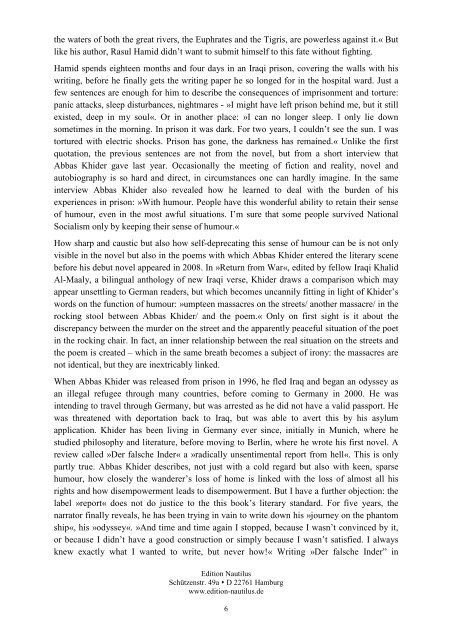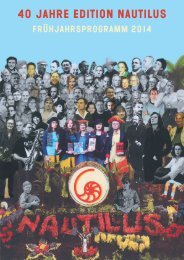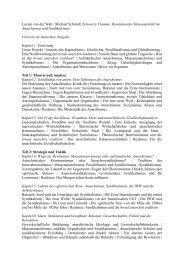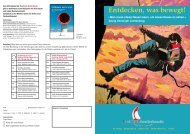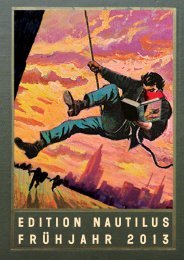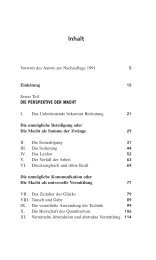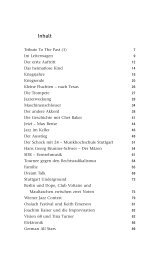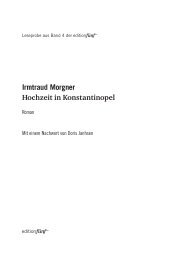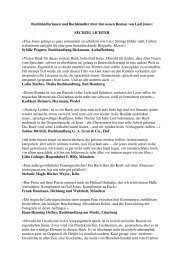Addional information on Abbas Khider
Addional information on Abbas Khider
Addional information on Abbas Khider
Create successful ePaper yourself
Turn your PDF publications into a flip-book with our unique Google optimized e-Paper software.
the waters of both the great rivers, the Euphrates and the Tigris, are powerless against it.« But<br />
like his author, Rasul Hamid didn’t want to submit himself to this fate without fighting.<br />
Hamid spends eighteen m<strong>on</strong>ths and four days in an Iraqi pris<strong>on</strong>, covering the walls with his<br />
writing, before he finally gets the writing paper he so l<strong>on</strong>ged for in the hospital ward. Just a<br />
few sentences are enough for him to describe the c<strong>on</strong>sequences of impris<strong>on</strong>ment and torture:<br />
panic attacks, sleep disturbances, nightmares - »I might have left pris<strong>on</strong> behind me, but it still<br />
existed, deep in my soul«. Or in another place: »I can no l<strong>on</strong>ger sleep. I <strong>on</strong>ly lie down<br />
sometimes in the morning. In pris<strong>on</strong> it was dark. For two years, I couldn’t see the sun. I was<br />
tortured with electric shocks. Pris<strong>on</strong> has g<strong>on</strong>e, the darkness has remained.« Unlike the first<br />
quotati<strong>on</strong>, the previous sentences are not from the novel, but from a short interview that<br />
<strong>Abbas</strong> <strong>Khider</strong> gave last year. Occasi<strong>on</strong>ally the meeting of ficti<strong>on</strong> and reality, novel and<br />
autobiography is so hard and direct, in circumstances <strong>on</strong>e can hardly imagine. In the same<br />
interview <strong>Abbas</strong> <strong>Khider</strong> also revealed how he learned to deal with the burden of his<br />
experiences in pris<strong>on</strong>: »With humour. People have this w<strong>on</strong>derful ability to retain their sense<br />
of humour, even in the most awful situati<strong>on</strong>s. I’m sure that some people survived Nati<strong>on</strong>al<br />
Socialism <strong>on</strong>ly by keeping their sense of humour.«<br />
How sharp and caustic but also how self-deprecating this sense of humour can be is not <strong>on</strong>ly<br />
visible in the novel but also in the poems with which <strong>Abbas</strong> <strong>Khider</strong> entered the literary scene<br />
before his debut novel appeared in 2008. In »Return from War«, edited by fellow Iraqi Khalid<br />
Al-Maaly, a bilingual anthology of new Iraqi verse, <strong>Khider</strong> draws a comparis<strong>on</strong> which may<br />
appear unsettling to German readers, but which becomes uncannily fitting in light of <strong>Khider</strong>’s<br />
words <strong>on</strong> the functi<strong>on</strong> of humour: »umpteen massacres <strong>on</strong> the streets/ another massacre/ in the<br />
rocking stool between <strong>Abbas</strong> <strong>Khider</strong>/ and the poem.« Only <strong>on</strong> first sight is it about the<br />
discrepancy between the murder <strong>on</strong> the street and the apparently peaceful situati<strong>on</strong> of the poet<br />
in the rocking chair. In fact, an inner relati<strong>on</strong>ship between the real situati<strong>on</strong> <strong>on</strong> the streets and<br />
the poem is created – which in the same breath becomes a subject of ir<strong>on</strong>y: the massacres are<br />
not identical, but they are inextricably linked.<br />
When <strong>Abbas</strong> <strong>Khider</strong> was released from pris<strong>on</strong> in 1996, he fled Iraq and began an odyssey as<br />
an illegal refugee through many countries, before coming to Germany in 2000. He was<br />
intending to travel through Germany, but was arrested as he did not have a valid passport. He<br />
was threatened with deportati<strong>on</strong> back to Iraq, but was able to avert this by his asylum<br />
applicati<strong>on</strong>. <strong>Khider</strong> has been living in Germany ever since, initially in Munich, where he<br />
studied philosophy and literature, before moving to Berlin, where he wrote his first novel. A<br />
review called »Der falsche Inder« a »radically unsentimental report from hell«. This is <strong>on</strong>ly<br />
partly true. <strong>Abbas</strong> <strong>Khider</strong> describes, not just with a cold regard but also with keen, sparse<br />
humour, how closely the wanderer’s loss of home is linked with the loss of almost all his<br />
rights and how disempowerment leads to disempowerment. But I have a further objecti<strong>on</strong>: the<br />
label »report« does not do justice to the this book’s literary standard. For five years, the<br />
narrator finally reveals, he has been trying in vain to write down his »journey <strong>on</strong> the phantom<br />
ship«, his »odyssey«. »And time and time again I stopped, because I wasn’t c<strong>on</strong>vinced by it,<br />
or because I didn’t have a good c<strong>on</strong>structi<strong>on</strong> or simply because I wasn’t satisfied. I always<br />
knew exactly what I wanted to write, but never how!« Writing »Der falsche Inder” in<br />
Editi<strong>on</strong> Nautilus<br />
Schützenstr. 49a � D 22761 Hamburg<br />
www.editi<strong>on</strong>-nautilus.de<br />
6


